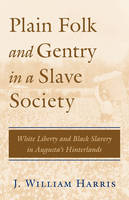
Plain Folk and Gentry in a Slave Society
White Liberty and Black Slavery in Augusta's Hinterlands
Seiten
1998
Louisiana State University Press (Verlag)
978-0-8071-2265-5 (ISBN)
Louisiana State University Press (Verlag)
978-0-8071-2265-5 (ISBN)
In this study of the communities on both sides of the Savannah River in Georgia and South Carolina, J. William Harris explores two great ironies of American history, the South's commitment to a liberty supported by slavery and its attempt to maintain the status quo with a war that undermined southern society.
In this exciting study of the communities on both sides of the Savannah River in Georgia and South Carolina, J. William Harris explores two great ironies of American history, the South's commitment to a liberty supported by slavery and its attempt to maintain the status quo with a war that undermined southern society. Relying on strong research in quantifiable data as well as manuscript records, Harris examines why white southerners, most of whom did not own slaves, united in a long, bloody war to preserve the institution. He argues that slaveowners relied on an ideology of liberty, a potential for social mobility, and a web of personal relationships between classes to contain white class divisions and ensure control over the black population. The strains of war, Harris shows, dissolved these bonds of community and made Confederate victory impossible, forever changing southern society.
In this exciting study of the communities on both sides of the Savannah River in Georgia and South Carolina, J. William Harris explores two great ironies of American history, the South's commitment to a liberty supported by slavery and its attempt to maintain the status quo with a war that undermined southern society. Relying on strong research in quantifiable data as well as manuscript records, Harris examines why white southerners, most of whom did not own slaves, united in a long, bloody war to preserve the institution. He argues that slaveowners relied on an ideology of liberty, a potential for social mobility, and a web of personal relationships between classes to contain white class divisions and ensure control over the black population. The strains of war, Harris shows, dissolved these bonds of community and made Confederate victory impossible, forever changing southern society.
J. William Harris is a professor of history at the University of New Hampshire. The Old South: New Studies in Society and Culture and Deep Souths: Delta, Piedmont and Sea Island Society in the Age of Segregation, which was a finalist for the Pulitzer Prize in History in 2002, are among his published books.
| Erscheint lt. Verlag | 30.4.1998 |
|---|---|
| Verlagsort | Baton Rouge |
| Sprache | englisch |
| Maße | 140 x 216 mm |
| Themenwelt | Geschichte ► Allgemeine Geschichte ► Neuzeit (bis 1918) |
| Geisteswissenschaften ► Geschichte ► Regional- / Ländergeschichte | |
| Geschichte ► Teilgebiete der Geschichte ► Kulturgeschichte | |
| Geschichte ► Teilgebiete der Geschichte ► Militärgeschichte | |
| Geschichte ► Teilgebiete der Geschichte ► Sozialgeschichte | |
| Sozialwissenschaften ► Soziologie ► Makrosoziologie | |
| ISBN-10 | 0-8071-2265-3 / 0807122653 |
| ISBN-13 | 978-0-8071-2265-5 / 9780807122655 |
| Zustand | Neuware |
| Haben Sie eine Frage zum Produkt? |
Mehr entdecken
aus dem Bereich
aus dem Bereich
Europa 1848/49 und der Kampf für eine neue Welt
Buch | Hardcover (2023)
DVA (Verlag)
CHF 67,20
Giordano Bruno - ein ketzerisches Leben
Buch | Hardcover (2024)
C.H.Beck (Verlag)
CHF 41,85


